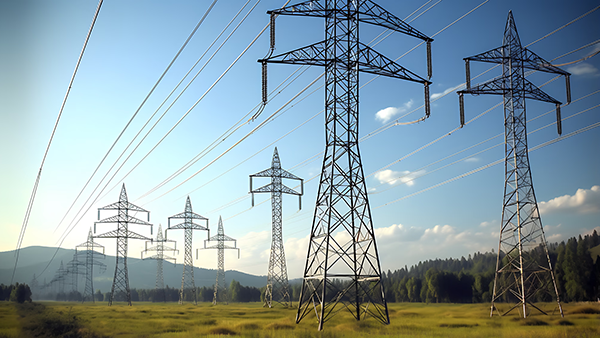
Kazakhstan is increasing imports of electricity from Russia at high prices
By Rhod Mackenzie
Kazakhstan has started purchasing electricity from the Russian Federation at a higher price due to new trade regulations between the two countries. The average delivery cost in the second half of 2023 increased by almost a third, exceeding 5 rubles per kWh. Analysts predict that Kazakhstan will continue to increase its electricity imports from Russia due to a deficit caused by long-term underfunding of its own generation capabilities.
According to local regulators, after the launch of the energy market on July 1, 2023, Kazakhstan significantly increased both the volume and cost of purchasing electricity from the Russian Federation.
Customs statistics show that from July to December of last year, Kazakhstan purchased over 3 billion kWh from Russia, a 156% increase compared to the same period in 2022.
The cost of these purchases also rose significantly, reaching $172 million, a 175% increase. The average supply price increased by 7.5% year-on-year to $0.057 per 1 kWh in dollars and by almost a third to 5.4 rubles in rubles.
Kazakhstan's total installed capacity is 24.6 GW. The projected production for 2023 is 112.82 billion kWh, while consumption is expected to reach 115.07 billion kWh, indicating a 1.9% year-on-year increase. According to KEGOC (the dispatcher of the energy system of Kazakhstan), imports from the Russian Federation are expected to rise to 4.99 billion kWh in 2023 from 1.93 billion kWh in 2022.
Kazakhstan purchases the majority of its electricity from the European part of the Russian Federation and a smaller portion from Siberia. The volume and price of supplies from Russia have increased due to changes in trade rules between the two countries. Kazakhstan is obligated to plan its electricity purchases from Russia for each hour of delivery on the following day. According to data from KOREM JSC, starting from July 1, the cost of electricity purchased by Kazakhstan above the planned volume has increased. Specifically, the delivery price now includes Inter RAO's (the monopoly exporter of the Russian Federation) profitability at 2.5%, instead of the usual 0.5%. During peak hours of loading the Russian energy system, the wholesale price (excluding transmission tariffs) for Kazakhstan exceeded the plan by 52 tenge or 10 rubles per 1 kWh. According to a reports, Kazakhstan previously paid below market prices for these volumes.
The Ministry of Energy of Kazakhstan admitted to being inaccurate in planning the purchase of electricity from the Russian Federation. From July to December, the republic purchased approximately 2.96 billion kWh. According to data from KOREM JSC, the volume of purchases exceeded the plan for this period by 0.91 billion kWh, which is approximately 30% of the total supply. The total cost of delivery above the plan is RUB 3.27 billion, with an average price of 3.53 rubles per 1 kWh. In December 2023, purchases in excess of the plan amounted to 303.2 million kWh for 1.1 billion rubles.
In January and February of this year, the Russian Federation exported a total of 697.3 million kWh to Kazakhstan. However, only 250 million kWh were planned, with the remaining amount being delivered over the plan.
The Ministry of Energy in Kazakhstan reported that the cost of delivery over the plan for two months was 1.65 billion rubles, at an average price of 3.66 rubles. The poor consumption planning in Kazakhstan is due to the limited number of metering devices. Inter RAO declined to comment.
It is not profitable for Kazakhstan to purchase electricity from the Russian Federation beyond the plan. The average monthly price of wholesale electricity within the country, which is the same as the price of a single buyer, ranges from 12.9-14.5 tenge or 2.2-2.9 rubles per 1 kWh, according to estimates by the analytical company SCM Market Predictor. SCM Market Predictor estimates show that between July 2023 and February 2024, approximately 27 billion kWh were sold through the wholesale energy market in Kazakhstan. Of this, 36% was sold at centralized auctions, similar to the Russian day-ahead market. During peak shortage hours, Kazakhstan purchases around 5% of its demand from the Russian Federation, and a small volume of up to 0.5% is purchased from Kyrgyzstan.
According to Sergei Sasim, director of the Center for Electric Power Research at the Higher School of Economics, the cost of supplying electricity from Russia to Kazakhstan appears to be market-based. Furthermore, as of the end of 2023, the single-rate price in the first price zone (the European part of the Russian Federation and the Urals) was approximately 2.78 rubles per kWh, while in the second zone (Siberia) it was 2.32 rubles, which is even lower than the average price of a single buyer on the Kazakhstan market in some months, as clarified by the analyst. In addition, Mr. Sasim notes that the wholesale price of the Russian market already considers the extensive generation renewal programs that have enabled meeting export demands.
According to Sergei Rozhenko from Kept, the absence of the marginality principle in the Kazakhstan market suggests that the objective market price in the republic should be significantly higher and restrained due to non-market mechanisms.
He also believes that there will be a structural deficit of electricity in Kazakhstan in the medium term due to steady growth in demand, which is expected to reach 30% by 2030, as well as systemic underinvestment in traditional generation. Although some management decisions have been made to increase coal capacity, the construction process is slow and can take up to five to seven years. Therefore, the author believes that the situation is unlikely to improve significantly in the near future.
